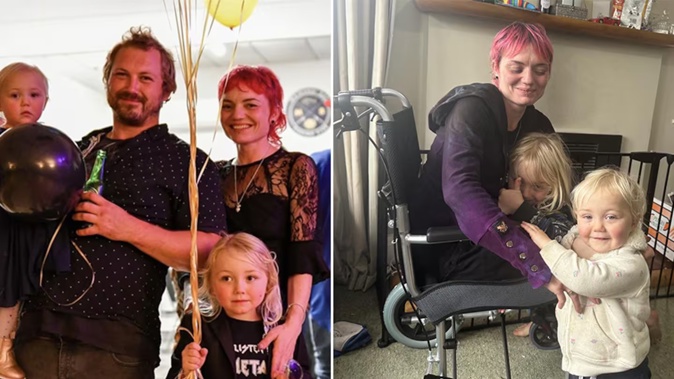
A Kiwi mum with one of the world’s most painful and debilitating conditions has made a desperate plea to raise funds for treatment that could dramatically change her life.
Masterton woman Natasha Brucker, 32, has suffered from Complex Regional Pain Syndrome (CRPS) for more than eight years. It is a rare and extremely painful incurable neurological condition that causes nerve pain throughout the body.
After carpel tunnel surgery, she developed CRPS which is also known as the “suicide disease” due to the amount of people who take their own lives as the pain of the condition is too immense.
Most sufferers of the poorly-understood condition experience crippling nerve pain, which can feel like they are being burned, stung or stabbed. It is considered to be more painful than child birth and amputation.
Brucker has started a Givealittle page and needs to raise $80,000 to heard overseas, either to the US or Italy for potentially life-saving treatment.
Brucker told the Herald that the pain in the past few weeks has been so severe that she is now wheelchair and bed-bound and doesn’t know if she can carry on without seeking medical treatment overseas.
“The McGill scale is what they measure all pain on. CRPS is rated above giving birth and amputation. It’s known as one of the most painful conditions known to man.
“It feels like electric fire is running through my veins and that my whole body is wrapped in barb wire. It’s constant pain. I’ve lost so much strength, muscle and weight from it. My eyesight goes blurry. It’s f**king scary.”
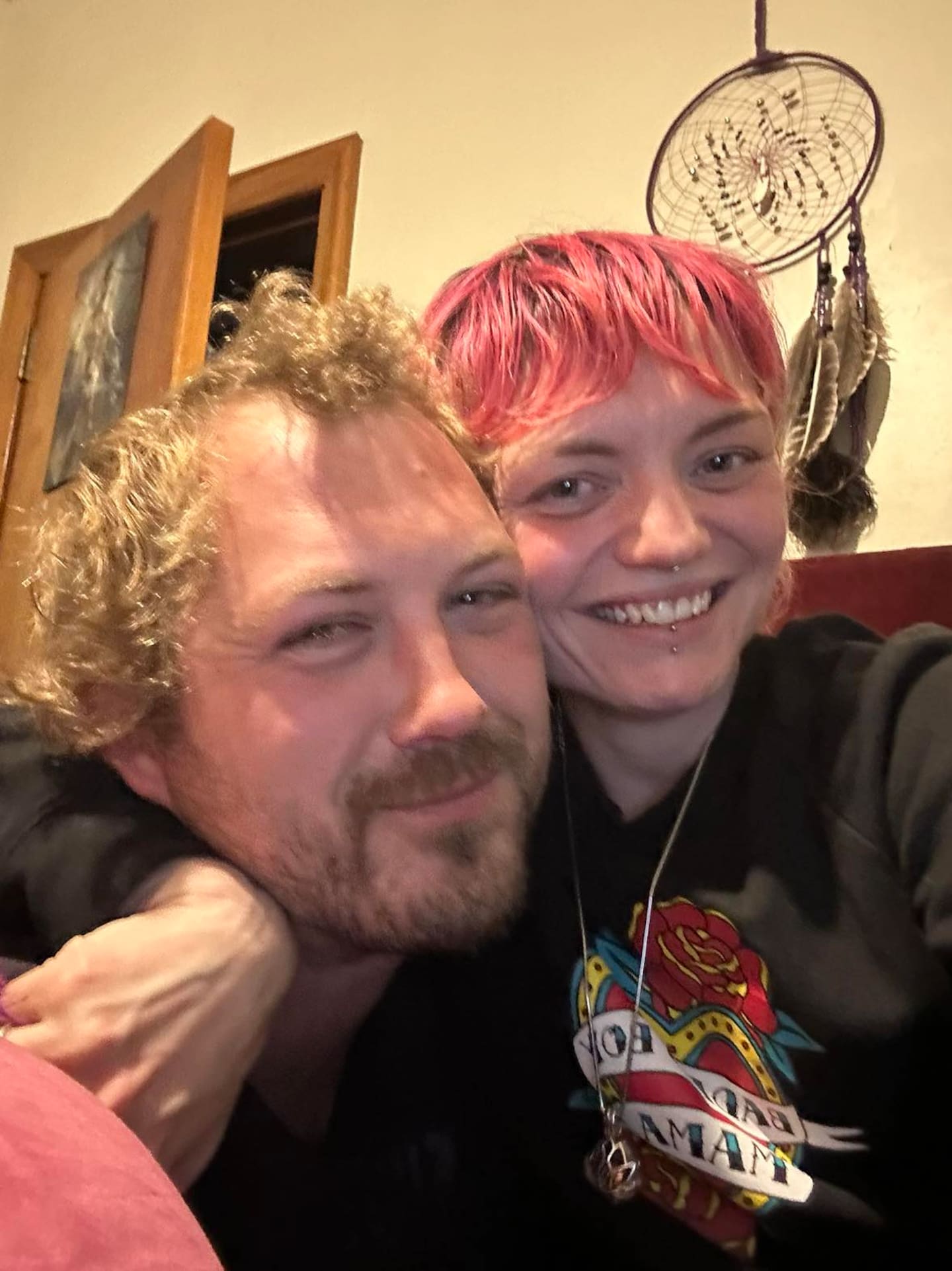
Josh Coles and Natasha Brucker have been together for 16 years, with Brucker's partner now her full time carer after she became wheelchair and bed-bound a few weeks ago.
The mother of two’s condition has deteriorated over the past few years which forced her to give up work. It also meant Josh Coles, her partner of 16 years, is now caring for Brucker and their two young children full time.
In recent weeks Brucker has gone from being able to go to the shops to being restricted to her room, and can’t even touch her her own children due to the pain.
“I have no choice but to put myself out there now. I have to be there for my kids.
“Right now I can’t even be around them because of how much pain I’m in physically. I can’t be their mum and that’s heartbreaking.
“I need Josh (her partner of 16 years) to sometimes pick up a cup, or feed me because I’m so weak and in so much pain.
“Three weeks ago I felt things getting rapidly worse. I was getting stuck in places while I was out, sometimes as long as five or six hours because I was in so much pain.
“Then one day I just couldn’t walk anymore. Now I’m in a wheelchair.”
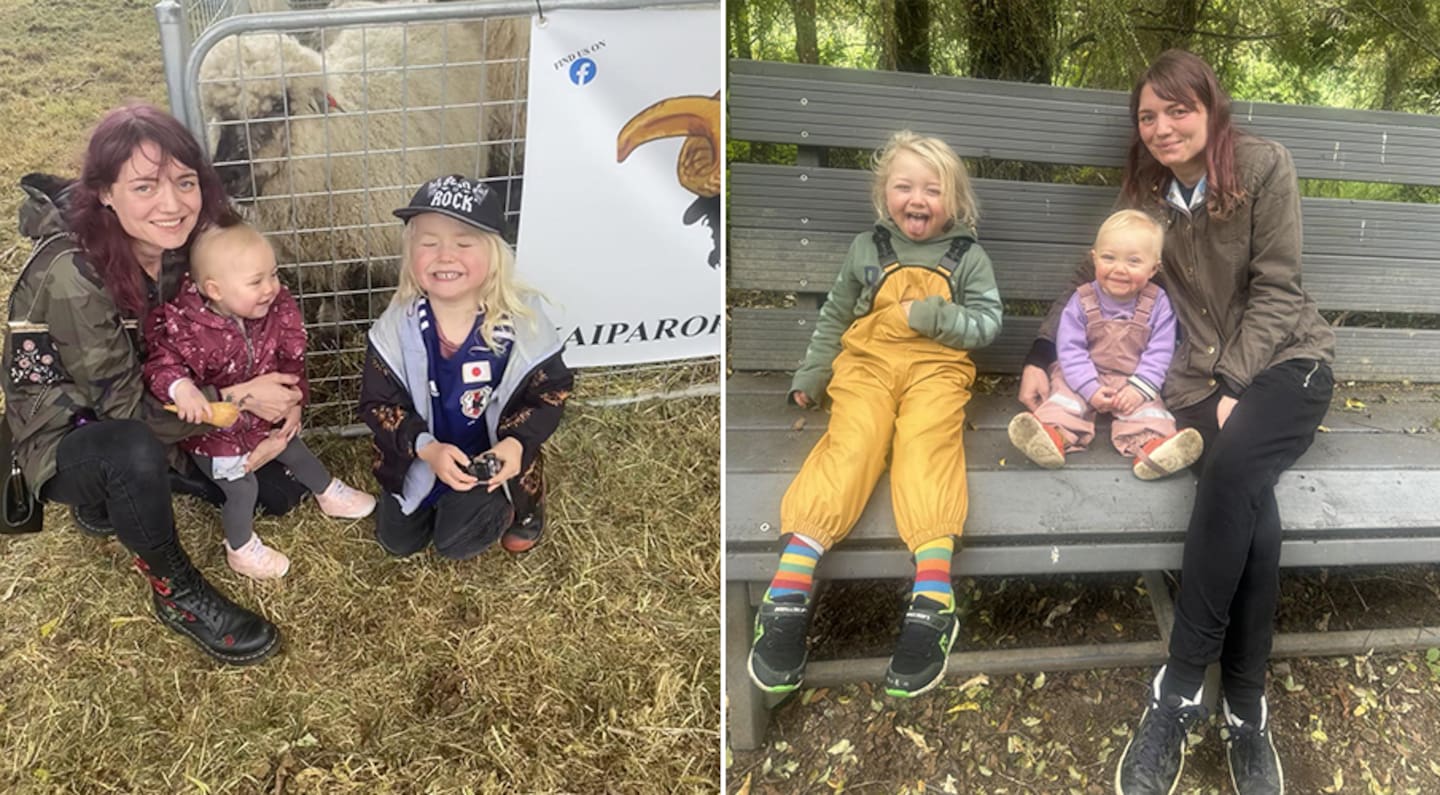
Natasha Brucker was a hands on mother to her children Henry, now 5, and Lilith, soon 2. Now she struggles to have physical contact with them because her pain levels are so high.
How overseas CRPS treatments could change her life
Brucker is desperately trying to raise funds to head overseas to undergo either Neridronate Acid infusions in Italy which treats both the symptoms and the root cause, or receive ketamine infusions in the US, which have proven successful in reducing pain.
Brucker needs to raise $80,000 to afford the life-changing treatments that could give her a near-normal life again.
Neridronate Acid infusions - Italy
Neridronate Acid treatment has been used for eight years as one of the main treatments for CRPS in Italy, with great effect.
While Ketamine is more accessible around the globe and acts as isntant pain relief, Neridronate Acid infusions both alleviate pain and regenerate bone strength leading to symptoms decreasing in severity over time.
According to CRPS Treatment Italy, Neridronate takes six months to effectively kick in where as ketamine gives instant pain relief.
While the research is relatively new, they claim Neridronate has seen some people with CRPS enter complete remission within months.
Some patient testimonies claim they’ve gone from being wheelchair-bound to running road races and taking up sport again.
The treatment has been approved by the Italian Drug Agency and is now a standard treatment against CRPS in Italy.
“This is my preferred option,” Brucker said. “I like the fact they are targeting the root cause which could give me longer term success.
“We’re hoping if I get the Neridronate infusion will stop further progression and go into a state of remission. Hopefully I’ll be able to get out of the wheelchair and participate in life.
“Even if don’t have that initial pain relief ketamine could give, at least I know my future is brighter.”
Brucker is also in favour of heading to Italy because the costs are tens of thousands of dollars less and the infusions are over a 10 day period, as opposed to receiving ketamine infusions in the US where she would need months of treatment.
Ketamine infusions - US
As ketamine infusions are extremely limited in New Zealand for adults, Brucker is forced to look overseas.
Ketamine works directly in the brain to decrease pain. It does this by blocking neurotransmitters at the N-methyl-D-aspartate (NMDA) receptors that allow people to feel pain.
By blocking these neurotransmitters, ketamine allows the brain to make new neural pathways, moving past any damage from whatever caused a person’s CRPS.
According to Starship, ketamine has been reported to be effective for acute and chronic pain management.
Brucker says there are some success stories for those with CRPS who undergo ketamine infusions and that it is one of two realistic options that give her glimmer of hope.
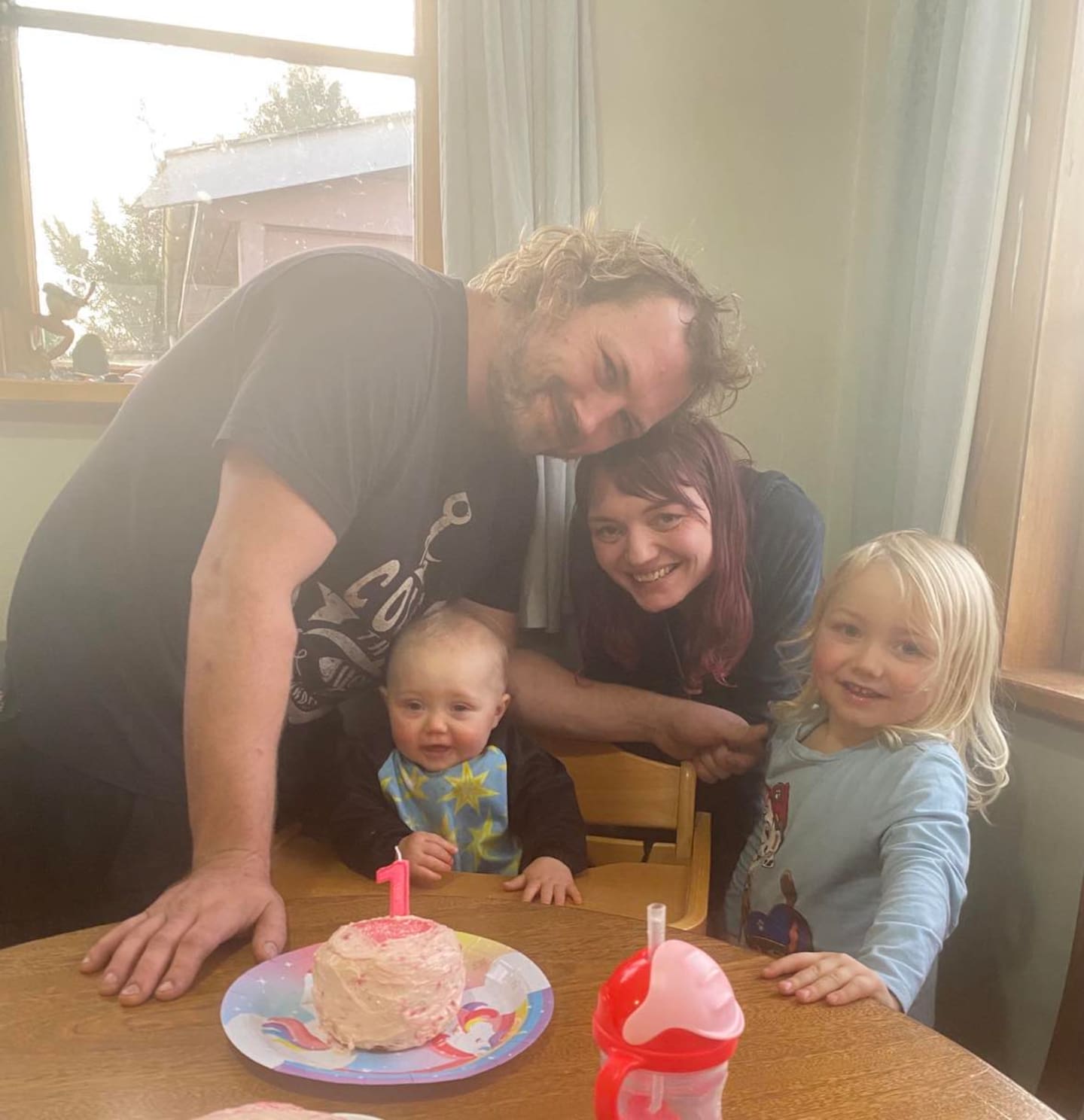
Natasha Brucker, pictured with her two children and partner, has credited the love of her life Josh Coles for loving her at the lowest and most crippling moments of her life.
“It involves the whole family going to Florida. I need a total of 16 infusions over three months. Because it’s ketamine I’ll be tripping and that’s why I need my family there to ground me.
“I’ve got a friend in the US who goes to the same doctor and they’ve given me their treatment plans. We need $80,000 to get there to even do it. I just want some hope that there is a brighter future for me.
“I want to be the hands-on mother I’ve always dreamed of being. Ketamine will give me instant pain relief, but it’s likely putting a plaster over a gaping wound. But if that turns out to be my only option I’ll take it because I want to be pain free.”
Brucker’s struggles with NZ health system
Since Brucker’s 2015 diagnosis, the 32-year-old claims to have had numerous struggles with the NZ health system, from not being believed about her condition to allegedly being pressured back to work before she was ready.
While off work and on ACC, Brucker claimed she felt pressured by the organisation to get back to employment earlier than she felt physically ready for.
Once she was back at work part time in an office manager role, she explained she felt pressure from ACC about her lack of hours and questions were raised about doing more.
“The truth is I was struggling to get through the hours I was having to work. I felt bullied and that my condition wasn’t being taken seriously.”
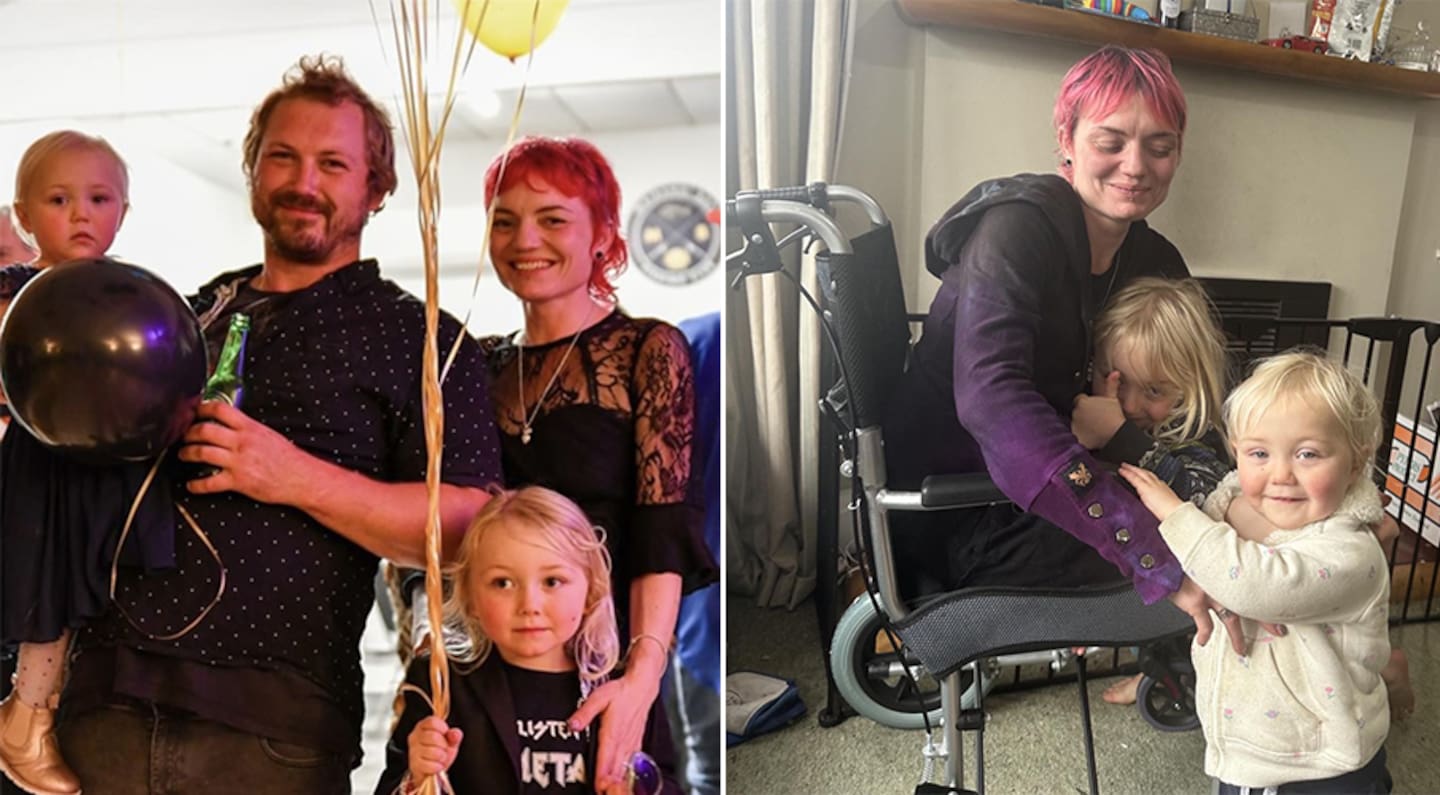
Mother of two Natasha Brucker, who suffers from one of the most painful conditions in the world is desperately trying to raise funds for life-changing treatment only accessible to her in the US.
She eventually went off ACC after that feeling of pressure took its toll, taking the family down to one income. However, over the past year, Josh’s full time work soon reduced to part time and now with Brucker being bed-bound, Josh has had to effectively give up work to become a full time carer.
More recently, after Brucker’s doctor moved on, she struggled to find a GP who knows what CRPS is, takes her condition seriously, and doesn’t have a waiting list.
“I”m struggling to even get pain relief from the doctors. Many doctors haven’t heard of CRPS.
“For years I’ve had roadblocks from the system. Every road I turn to for help is so difficult. I just want to be heard and acknowledged that this is real.
“I went to see a locum and he said he had no idea what CRPS is and didn’t want to prescribe me pain relief strong enough to even remotely battle this condition.
“Josh had to wheel me out and I was in tears. I just want to be heard and have the system treat me like I’m not crazy or making this up,” Brucker told the Herald.
One of the frustrations Brucker has is that case studies conducted by ACC found that there is evidence ketamine is a “promising treatment for CRPS in the short term”.
Their recommendation in a 2014 finding was that “ACC should continue to purchase ketamine infusion on a case-by-case basis for treating neuropathic pain related to CRPS.”
Brucker feels that after eight years and previously being on ACC for CRPS, that she fits the criteria for receiving ketamine infusions in New Zealand.
“I just want the system to fight for me..”
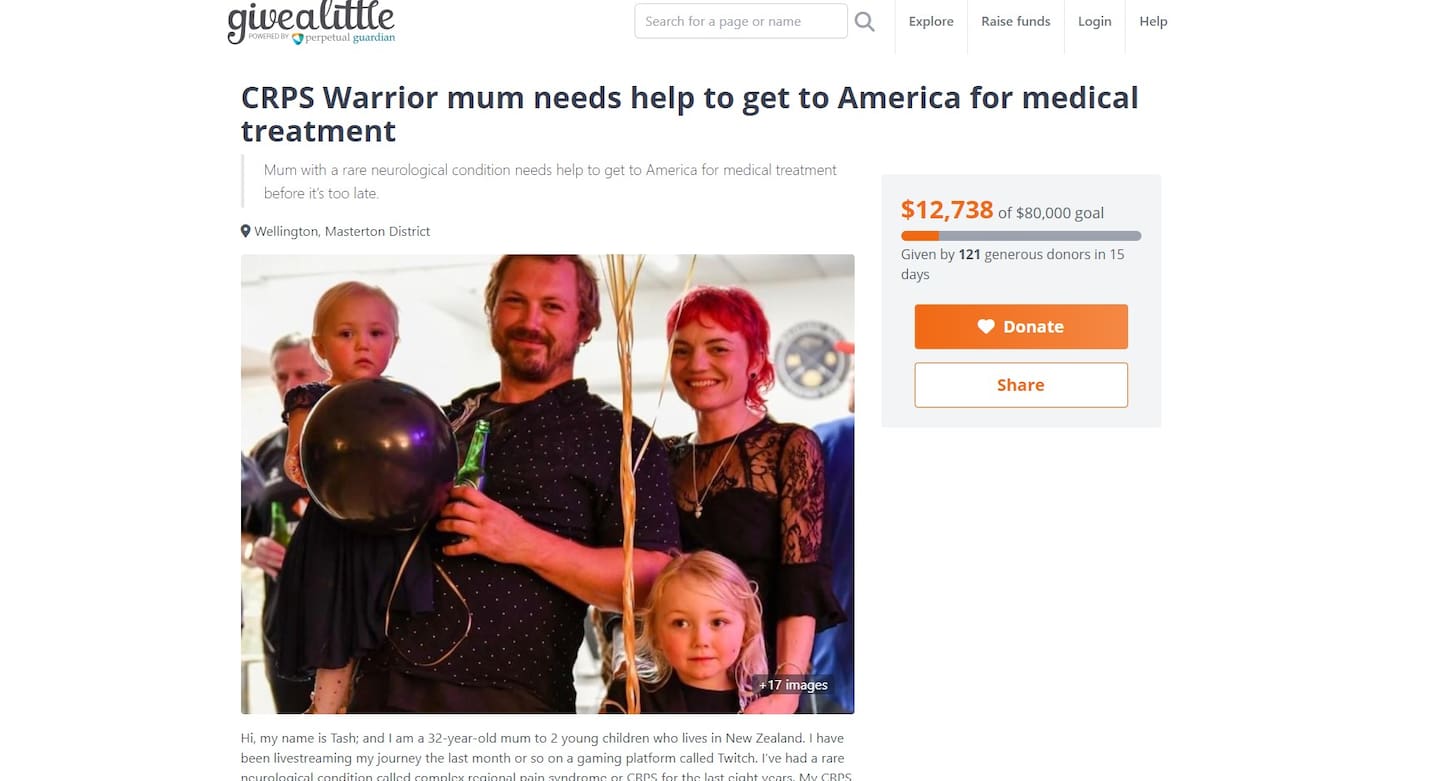
Natasha Brucker has set up a Givealittle page to help get her to the US for life-changing medical treatment.
Based on international statistics, between five and 26 in 100,000 people develop CRPS. It is not known how many people in NZ suffer from CRPS.
So far $25,000 has been raised.
Along Brucker’s journey, she has documented her progress and decline of living with CRPS on Twitch, and uses it to promote CRPS awareness for others suffering the crippling condition.
She says the ability to connect with others, speak openly about CRPS and make friends with people going through the same illness has been a “life saver” and given her purpose and a sense of community while stuck in her own home.
Take your Radio, Podcasts and Music with you









